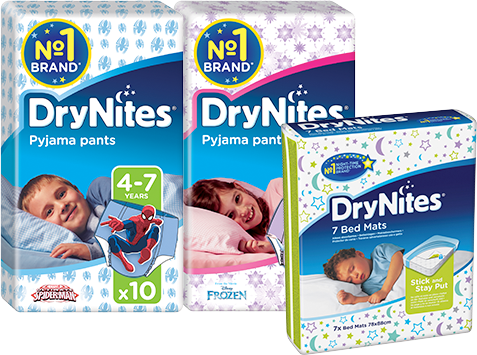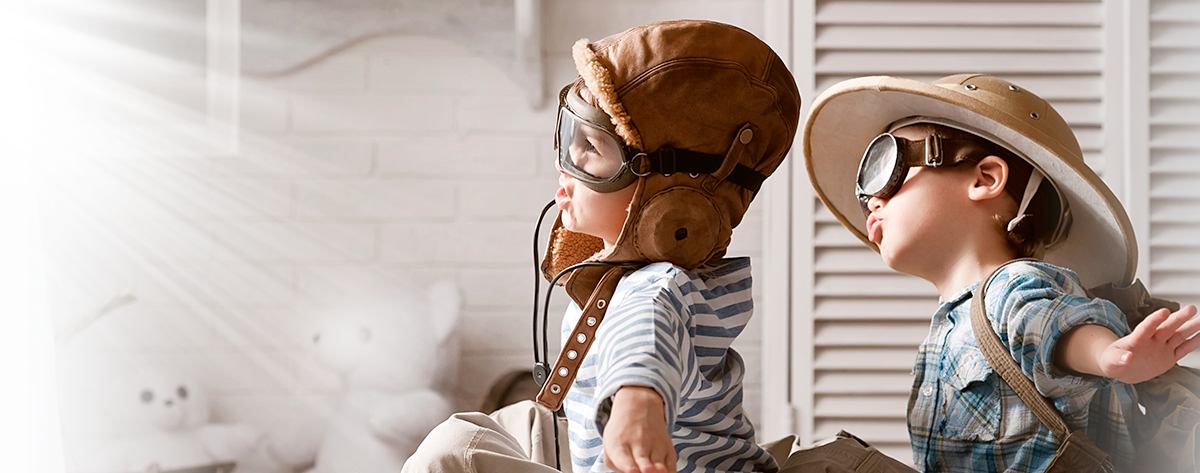If you have any questions that are not answered below, you can ask our bedwetting expert, Dr Penny Dobson.
General
Should I stop giving my child drinks after 4pm?
Stopping drinks after 4pm is not a good idea - as it is important to keep your child well hydrated throughout the day and evening. This is for your child’s general health and the health of their bladder. Drinking good levels of water enables the bladder to reach its full capacity (when you get the sensation of fullness).If you drink less your bladder "adapts" by holding less before that fullness sensation. The kidneys also adapt if you don’t drink enough by re-absorbing fluid - causing the urine to become more concentrated. This in turn can "irritate" the bladder – and also contribute to bedwetting.
So make sure your child has plenty to drink throughout the day ( NICE ( National Institute for Health and Excellence guidelines recommend between 1,000 – 1,400 mls a day for 4-8 year olds, about 6-8 glasses).
Does wearing DryNites Pyjama Pants stop my child from becoming dry at night? People tell me that if they feel the wet pyjamas and sheets they might stop wetting the bed?
This is a very common question. However there is no evidence to suggest that this is true. DryNites Pyjama Pants won’t cure your child’s night wetting, but they will help you both manage the phase with discretion and confidence.
Will carrying my child to the toilet at night stop them wetting the bed?
No, there is no evidence that this helps and it might hinder. Most parents try this method at some point, as lifting their child from sleep and taking them to the toilet seems like a natural thing to do - to stop, or at least control, the bedwetting. But what it does is reinforce to the child that they can urinate when they are asleep. This of course does not help them to make that important connection between the bladder and the brain, so that they wake up or “hold-on” to the sensation of a full bladder.
My son won't sleep over at friends because he is worried he's going to wet the bed. What can I do as I don’t want him to miss out at sleepovers?
Sleepovers do not have to be avoided because of bedwetting episodes. Discuss with your son a strategy that he would feel comfortable with; for example, sharing the situation with the other child's parents and taking supplies of absorbent sleepwear such as DryNites. Work out how your son can get easy access to the toilet (many children are afraid of the dark) and how he would deal with any wet sleepwear discretely should he have an accident.
My 4 yr old boy has constipation issues... He was fine going to toilet but since starting primary school in September he has gone back to holding it in and therefore soiling his pants... What should we do?
It does sound as if your son may again be constipated. Many children who are constipated “hold on” to their poo because the poo has become large and hard and it hurts to pass. You have noticed soiling (this may be soft poo) or staining in his pants. This is not diarrhoea, although it is easy to think so. It is the leaking of soft fluid stools round the build-up of hard stools in the rectum (the lower part of the bowel) – this is sometimes called “overflow soiling”. It is important that you sort out the constipation first, before you can help your son return to a regular and comfortable pattern of toileting. So I suggest that you see your GP straight away for an assessment and a treatment plan. If you would like to learn more about the problem of constipation, do visit the ERIC website
My 3 year old has been potty trained for over a year. She was dry at night also during this time and would wake up to go if she needed. In the past two - three months she now wets every night. We have bought dry nights for her, she doesn't want to wear them but as she is wetting the bed up to 3 times a night we have to. I don't give them drinks before bed (she has 2 older sisters) we bought a new bed to try and encourage her but I'm not sure what to do I don't want to push her but as she was dry for so long before I'm not sure how to get her back. There hasn't been any major problems that I can think of any help or tips would be greatly appreciated
It does sometimes happen that children of your daughter’s age – and even older - become dry at night, then start wetting again. We don’t know why this happens, but is due to the complex “skill” of night-time dryness not yet being fully established. It sounds as if you are doing all the right things – to reassure and gently encourage her. Make sure that she drinks well during the day (about 6 glasses of water-based fluids) and continue to make bed-time a positive experience with a cuddle and night-time story. This is likely to right itself quite naturally.
Hi, My daughter is 6, and although dry day and night since the age of 2, when she went up to yr 1 at school we stared to get the occasional wet bed. She is a generally happy child, she doesn't have any obvious problems at school. We can go for weeks completely dry and then this week we've had 2 instances of wetting. I'm obviously worried about this and wondered if it's common for this to happen, or could they're be something else going on. We've seen a gap but they weren't very helpful unfortunately. I look forward to your reply.
It is not uncommon for children of your daughter’s age to have the occasional wet bed; this may be the result of a particular worry, or being tired – or often for no apparent reason. It just means that her ability to “hold –on” to a full bladder at night (or to wake and use the toilet) isn’t yet fully “secure”. This should, in time, sort itself out naturally. I am sure that you are reassuring her (as I hope that I am reassuring you!) that many other children will be in the same position – and that it is not something that your daughter has control over.
Bedwetting Pants
How does wearing DryNites® Pyjama Pants help?
For boys:
DryNites® Pyjama Pants not only help children who wet the bed get a good night’s sleep, they help them maintain a sense of privacy and boost their confidence. They make managing bedwetting easier for you as well, by minimising night time disruptions and wet sheets.
For girls:
DryNites® Pyjama Pants help girls who wet the bed get a good night’s sleep, maintain some privacy, and feel confident. They make managing bedwetting easier for you as well, by minimising night-time disruptions and wet sheets.
What size do DryNites® Pyjama Pants come in?
For boys:
DryNites® Pyjama Pants are available in three sizes:
3-5 years, (for Boys and Girls)
4-7 years, (for Boys and Girls)
8-15 years, (for Boys and Girls)
See the complete DryNites product range here
For girls:
DryNites® Pyjama Pants are available in three sizes:
3-5 years, (for Boys and Girls)
4-7 years, (for Boys and Girls)
8-15 years, (for Boys and Girls)
See the complete DryNites product range here
What’s the difference between nappies, potty training pants and DryNites® Pyjama Pants?
For boys:
Nappies and nappy pants offer similar levels of absorbency. Nappy pants are designed to allow change without having to lie down. Pull-Ups are designed for potty training: they have specific features like a learning liner that lets kids feel a brief sensation of wetness– an important indicator when potty training. Finally, DryNites are for children who already dry during the day, but wet the bed at night. They are more absorbent and discreet, something that’s especially important for older children
For girls:
Nappies and nappy pants offer similar levels of absorbency. Nappy pants are designed to allow change without having to lie down. Pull-Ups are designed for potty training: they have specific features like a learning liner that lets kids feel a brief sensation of wetness– an important indicator when potty training. Finally, DryNites are for children who already dry during the day, but wet the bed at night. They are more absorbent and discreet, something that’s especially important for older children
Causes
What causes bedwetting?
There are a number of reasons for bedwetting. Understanding the possible causes can help reassure both you and your child that bedwetting is a common issue and not something your child has control over.
Causes in 3-4 year olds https://www.drynites.co.uk/en/about-bedwetting/causes/causes-in-3-4-year-olds
Causes in 4-7 year olds https://www.drynites.co.uk/en/about-bedwetting/causes/causes-in-5-7-year-olds
Causes in 8+ year olds https://www.drynites.co.uk/en/about-bedwetting/causes/causes-in-8
Does bedwetting run in families?
If one parent wet the bed then each child in the family has a 43% chance of wetting the bed. If both parents wet the bed, then each child has a 77% chance of bedwetting. Our guide on bedwetting causes can help you find out more.
Our Pyjama Pants are here to help you manage bedwetting
- take a closer look


